My bus pulled to the side of the road outside the bus terminal in Cochabamba at 9pm. I had dozed off during the ride, and was a bit alarmed to disembark half-asleep into a hectic scene of hawkers and street vendors on the sidewalk of Avenida Ayacucho, the main north-south street in the city. After grabbing my backpack and fending off a guy trying to sell me a belt, I started hoofing it towards the main square. I didn’t have accommodations booked, but figured there should hopefully be a decent hostel near the plaza.
After some aimless roaming, confusion, and navigating my way through a Saturday night street festival with live band and carnival rides, I eventually found Running Chaskis Hostel four blocks north of the main plaza. I checked in and then headed out for dinner.
Luckily, I didn’t have to go far. Beneath the hostel is Tambo, a trendy bar with good food and drink. I had a Mediterranean plate with hummus, olives, salamis, prosciutto, and cheeses, and a couple of craft beers. All while enjoying live music: a portly Bolivian dude playing acoustic blues on a guitar and singing in Spanish with a deep, soulful voice.
The next morning, I hit the block to explore Cochabamba. It is a large city of some 600,000+, but the main parts that would interest a foreigner are all located in an area of about 10 blocks around and north of the main plaza. There is a large university in town and therefore a lot of young people and a happening nightlife. The city has something of a burgeoning gastronomy scene as well, with many recently established small, smart restaurants, cafes, and pubs springing up near Plaza Colon. Venturing 10 or so blocks in any direction from the main square, and one finds themselves in neighborhoods that are distinctly more, well, Bolivian (read: poor and undeveloped). The city has a comfortable climate: generally sunny, but not too hot during the days and cool but not cold during the nights. This was quite a nice reprieve after frigid La Paz.
I walked around for about two hours, stopping to see El Condor in the Plaza 14 de Septiembre (the lovely main plaza), Plaza Colon, Plaza Bolivar, an artisanal market, and an outdoor fruit market.
I returned back to the hostel with a score of fresh food at about noon and cooked a big brunch. Then I played interwebs poker all afternoon. I again little to no connectivity problems during the day, but then at about 6-7pm, during the latter stages of several tournaments, I begun to experience recurring disconnections. This was a frustrating theme in Bolivia. I lost money again on the day.
A crazy Costa Rican guy was interested in my pokering, and watched me play while I explained strategy for the final hour. My AA was cracked in my last tournament, and he (hilariously) went nuts throwing a couch pillow into the floor repeatedly, “PUTA MADRE!” Tilt much? After he regained his composure, he offered to buy me a beer as consolation, so we went out to a pub for sandwiches and beers.
The next day, I went to take a ride in the teleférico (gondola) up Cerro San Pedro to Cristo de la Concordia, but for some reason it was not running that day. Instead I spent the morning hanging in Paris Café.
By the afternoon, I was ready to get a move on towards Sucre. I went to the bus terminal and bought a ticket for an overnight bus leaving at 9pm.
I had lunch in one of the many small, trendy restaurants, called Menta, then spent the afternoon writing at the hostel. In the evening, I went back to Tambo for round two, then caught a taxi to the bus station.
The bus to Sucre arrived at 5:15am. I emerged into the freezing predawn and immediately bundled up with scarf and hat. I waited near the luggage compartment for my backpack to be unloaded, but it never came. After everyone else had retrieved their bags, I handed my luggage ticket to the baggage handler, “Mi mochilla?” He shook his head, “Eso es para Potosi,” gesturing to ‘POTOSI’ written in big block letters on my ticket. He explained that my bus company has buses depart Cochabamba at 9:30pm for both Sucre and Potosi. The person in Cochabamba must’ve made a mistake when checking my backpack, and had it loaded on the bus going to Potosi instead of Sucre. Unh hunnhh…
Indeed, it was a hectic scene at the terminal in La Paz the night before, with a dozen or so people standing around baggage counter, no line or anything, all jabbering at the clerk while trying to hand him their luggage. The clerk looked at my bus ticket when he took my bag, but I didn’t review the luggage ticket he gave me in return before putting it in my pocket. Note to self: check for correct details on luggage ticket if checking bag inside the bus station.
I went inside looking for help, and found a police office. I explained my situation to a sweet lady police officer sitting at the desk. Her male counterpart snickered at me as he listened. She understood the error that took place and rolled her eyes. Apparently, this sort of thing happens frequently. She explained she would help me, but I would have to wait until the office of my bus company opened up at 7:30am.
The bus station in Sucre is something. Sucre is the capital city of Bolivia. Quite large. Quite rich. But the bus station evidently hasn’t been updated since probably the 70s. It’s like a bus station you’d expect in an out of the way pueblo in northwestern Mexico—small and dingy. It was a quarter to 6am, but the place was already full of people, occupying every seat, nook and cranny, sprawled out on the floors, waiting for early morning buses. Of course, the place had no heating and it was 25F this morning. The locals were ready for this inconvenience, everyone wrapped blankets and sleeping bags. I was not. I spent two hours pacing the floor and spasmodically rubbing my hands together and jogging in place to keep warm. I saw some of the poor locals wearing little more than a windbreaker and sandals, and told myself to toughen up.
7:45am rolled around, and the policewoman and I went upstairs to the office. She explained everything to the kid working behind the counter. The kid took pictures of my bus and luggage tickets, and informed me he would call Potosi and have my bag loaded onto the next bus to Sucre, which would arrive around 4:30pm that afternoon. I was ambivalent. “Hmm, seems too easy for Bolivia,” I thought to myself. I thanked the policewoman and said goodbye. I was quite lucky she was there to help me, as the other on-duty, male police officer seemed indifferent to my situation.
I went out front to find three people loading into a collective taxi. I inquired, “La Plaza?” and the driver waved me into the car. The taxi first dropped off a couple of people in the hills, picked up another, then dropped me and another passenger off at the main plaza. I walked three blocks to Villa Oropeza Hostel.
It was barely 8:30am, and my bed wouldn’t be ready until noon. I ventured back out into the purple-grey frigid morning to find a café, but nearly nothing was opened yet. As I would learn during my stay in Sucre, the city doesn’t really get going until 9:30-10am. Apparently, nobody wants to leave home until the sun has been up for a couple of hours and had sufficient time to warm the city.
Eventually, I found a decent café on Parque Bolivar. It was not heated. Almost nothing is heated in Sucre, or Bolivia at large for that matter. I guess you’re just meant to be cold in Bolivia. I hung out reading for a couple of hours while having a breakfast sandwich and multiple cups of coffee.
After the sun had come up, and the city looked more inviting, I walked around exploring.
As mentioned, Sucre is the capital of Bolivia. Founded in the 1530’s, it’s one of the oldest cities in the Americas. As such, it is very colonial, with narrow cobblestone streets, Spanish style two-story buildings with balconies and red clay tiled roofs, and many old churches and basilicas. The downtown area near the main plaza is lovely—a throwback to the 1800’s, probably not appearing too different now than it did then. It lies in the south-central Bolivia with an altitude of 2800. It’s not quite as high as La Paz, but the elevation still makes the air thin and cold. It’s an artsy place, with many exhibitions and concerts put on free of charge by the government. There’s a lively culinary scene and nightlife to boot. I haven’t been to Santa Cruz and/or the northeast of Bolivia, but as far as I’m concerned, Sucre is where it’s at in Bolivia. Just a lovely, idyllic city. The type of place where a lot of travelers decide to hang out for a while.
Finally, at about noon, I returned to my hostel to supplement my poor sleep on the overnight bus with a nap.
After some tea, I headed back to the bus station at 4:30pm. I showed my tickets to a different guy working behind the counter who wasn’t aware of my situation, and, after about a dozen phone calls over the course of half an hour, the guy gave me a head nod to follow him. He led me out of the bus station to another office a few blocks away. Once there, I showed my tickets and they produced my backpack. It was a little worse for the wear and dustier than normal, but everything in order and accounted for. This morning I was figuring I’d never see my backpack again, mentally calculating the dollar and sentimental costs of the contents. Less than a day later I got it back, and it wasn’t even too much of a hassle. In Bolivia! I slipped the guy who accompanied me a 10er and caught a cab ride home.
In the evening, I found Florin restaurant for dinner. It was a small, dimly lit place with mostly Indian cuisine. I had a chicken vindaloo with sautéed vegetables, and it was superb. After dinner, I had ice cream in the plaza despite the cold. Then it was time to crawl into my warm cocoon and read for a spell before slumber.
The next morning, I went for a walk with the auxiliary goal to find a supermarket. Everything in Sucre is built into old colonial buildings. There’s no big box stores or even anything on the exterior of buildings, aside from the sign of supermarket brand I would not recognize, that would distinguish a supermarket from, say, a private residence. Finding somewhere took me almost an hour. Finally, I wandered past building that I would never have identified as a supermarket and saw a lady walking out with grocery bags.
I made an elaborate breakfast back at the hostel, and spent some time chatting with an Australian girl in the kitchen over coffee. In the afternoon, I walked due east to a flight of stairs leading up a big hill. After a short climb, I arrived at a lookout near a quiet village in the hills. There was a small square with people taking siestas in the shade. There was also Mirador Café that sits on the edge of the lookout. I sat at the café for a few hours drinking limonada de coco and eating fruit salad while reading. This is the way in Sucre—chill to the max while enjoying the surroundings.
I spent some more time walking around the city at dusk, then found myself at Abis Café on Plaza 20 de Agosto (the main plaza) for dinner. It’s owned by a friendly Dutch guy, who came over to chat with the token gringo. Hearing I was from the States, he recommended the cheeseburger. Funny observation: all Europeans seem to think Americans eat burgers for every meal. I was already planning to get the burger, so maybe the stereotype fits. It was a gigantic burger with homemade bun and real pork belly. Just to solidify my American stereotype, I didn’t stop after the burger and fries, but ended with a warm brownie and topped with scoops of vanilla and frutilla (strawberry) ice cream for dessert.
On the way home, I found a classical guitar concert going on in a building on the main square. I sat and watched some Bolivian virtuoso shred flamenco-style music and what sounded like Bach for about 45 minutes.
Back at the hostel, I hung out in the living room having a beer with two Kiwis dudes and a girl from Toronto. Pretty soon the temperature dropped sufficiently to send us all packing for the warm confines of our blanket loaded beds at about 10pm (again: nearly none of the buildings in Bolivia are heated).
The next morning was a repeat of the prior day: elaborate breakfast, conversation over coffee (this time with a German girl), wandering the city, and ending up at the mirador.
As I was reading, I got the itch to get a move on. Although Sucre is a beautiful city to hang for a while, I still have a long way to go before my trip concludes. In that light, the idea of idly passing another day or two in Sucre didn’t seem too wise. I did a quick internet search for buses to the south, and saw there was a 1pm to Potosi. It was already 12:15pm. I hustled back to my hostel, cancelled my reservation for the night, threw everything in my bags, and caught a collectivo to the bus station. I arrived at 1:10pm, but was right on time. A lady in the parking lot asked me sold me a ticket, and five minutes later I was aboard my bus, ready to keep rambling further to the south of South America.


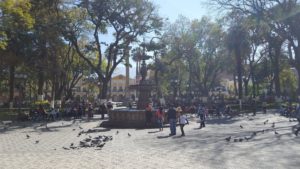
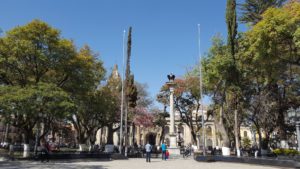
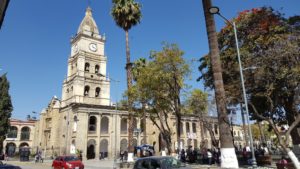
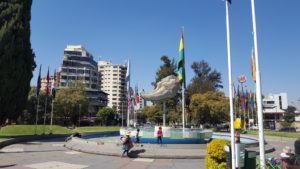
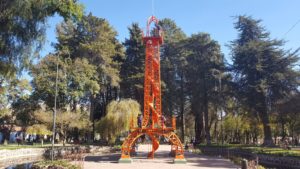
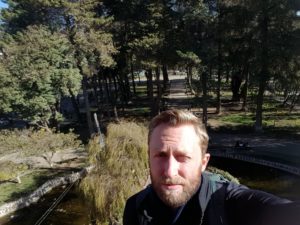
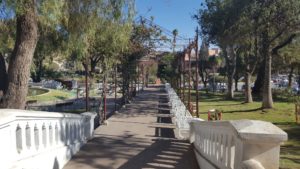
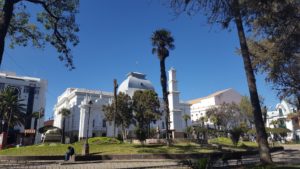
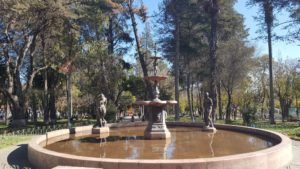
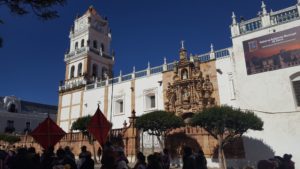
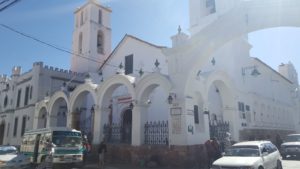
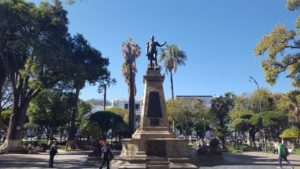
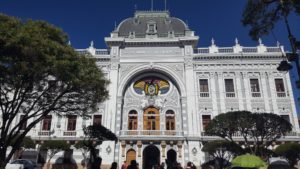
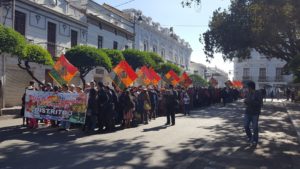
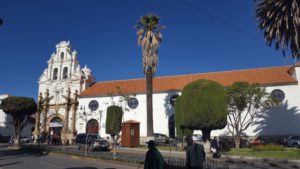
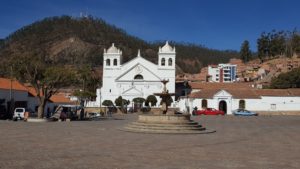
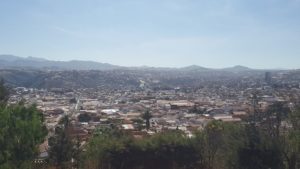
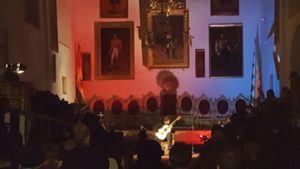
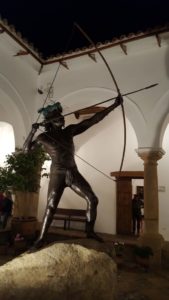
Hi dude, thanks for visit Sucre, just a correction, the main square in Sucre is “Plaza 25 de Mayo”